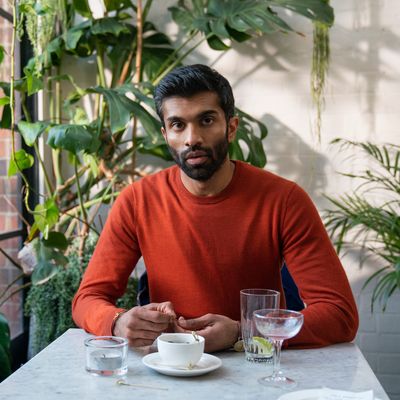
Starstruck, the new BBC series streaming on HBO Max, has a plot straight out of fanfic: Girl meets boy, girl goes home with boy, girl discovers boy is an extremely famous actor but she doesn’t care because she’s cool, boy totally falls in love with her. It’s a total fantasy come true, but thanks to the excellent writing of creator Rose Matafeo and co-writer Alice Snedden, it doesn’t feel fantastical at all.
Central to the show’s believability is Nikesh Patel’s endearingly neurotic portrayal of movie star Tom Kapoor. It’s not Patel’s first rom-com — or his U.S. debut, or even his first time playing an actor. He caused swoonage as Kash Khan, an unsatisfied investment banker–slash–wannabe actor who fell for the wrong woman in Mindy Kaling’s 2019 Hulu remake of Four Weddings and a Funeral, and was a leading man in the hit U.K. drama Indian Summers. Though he’s best known for his more romantic roles, Patel seeks roles and projects that change up the formula and push the industry forward, regardless of genre.
The Cut spoke to Patel about being a Rose Matafeo fanboy, representation, and whether he’d ever date a normie — sorry, civilian.
I really just loved Starstruck. It does such a good job of portraying a total romantic fantasy in a way that isn’t romanticized. How did you get involved with the show?
It was a slight role reversal. I was a Rose Matafeo fan because I knew her stand-up, and I’d been to her show with friends, and I thought she was brilliant. So when I saw she’d written the show, I was really excited. The audition process was a COVID audition process — the first time Rose and I met, my laptop was on my bookshelf over there and we were auditioning that way.
Rose is so cool. What was it like working with her?
So much fun. She’s really impressive. I think Starstruck shows off what a brilliant actress she is. But she also co-wrote the show. She’s an exec producer on it, so she has a real eye for what’s going to make this not feel like it’s been done a million times before.
Rose and Alice Snedden, who co-wrote it, they’re so in that rom-com world that it means that when they created something, it was both an homage to those stories, but also a spin that made it feel relevant for people now.
It’s funny, too, because your character is this hot leading man and the stereotype would be that he’s very charming, maybe a sweet-talker. But your character, Tom, is often frozen, not knowing what to say.
I think that’s true of a lot of actors. I’d say I drew upon a version of myself to inhabit Tom — not that we’re the same — I don’t have the same life that he does by any means. The fun came from going, Okay, how do I make that relatable? When you drill down into it, a lot of what Rose and Alice have offered up of that lifestyle is actually an obstacle. It’s not this great, glamorous thing.
What Tom really wants is to connect with this girl that he’s met, and it’s kind of his work life that keeps creating obstacles, but it just so happens that his work life is in showbiz. It was fun to grapple with that side of portraying what being an actor is like in a comedy.
It was also really cool to see a show where both leads are not white. I read that when you were cast, the name of your character was changed to be more true to your background.
That was a conversation that Rose initiated as soon as I was cast. The part as written, Tom had a name that felt coded quite English or American or white, so when I was cast and Rose said, “Is there anything you want to ask about the script?” The only thought I had was, Now that I’m playing the part, why not reflect my ethnicity and my heritage? And we talked about that and so Tom became Tom Kapoor. I’m really grateful to Rose that that’s not even something that I had to bring up. I think that understanding comes from her being of mixed heritage herself.
There was nothing else in the script that needed to meet me, because everything else was quite relatable, whatever you look like or wherever you’re from. I wasn’t really part of other decisions — I think they came sort of organically, but they were all informed by conversations that the industry on this side of the pond has been having, much like in the States, particularly in this moment of, I suppose, awakening or reality check that came post–George Floyd’s murder, and really thinking about the the impact that storytelling has; whether it’s deliberate or not, these choices have an impact.
I also appreciated the way that consent was centered in all of the sexual interactions, but it was done in a way that felt really natural. A lot of the TV writing you see, post–Me Too, is often written in a way where it’s like, “Yes, Me Too happened and we are going to acknowledge that.” Did you have conversations about that as a cast? Or did it just kind of come naturally?
I’ve experienced that positive reception particularly to the depiction of sex firsthand, just from female friends going, “It’s so refreshing.” And part of the reason it’s refreshing is it’s not packaged as a lecture. Rose and Alice are better writers than that.
So it happens in the tête-à-tête of two people getting to know each other. It comes out through character. And yet, it’s weird that it feels new. It’s great in some ways, but then it’s also like, this shouldn’t feel new. I can’t speak for her, but I don’t think Rose particularly set out to go, I want to make a point about consent.
Yeah, it doesn’t seem like she’s making a point. It just seems like it’s a natural part of who the character is, and the way that sex should work, which is, I think, what’s so great about it.
Screen portrayals of relationships and sex can can sometimes be idealistic in a way that’s not helpful, or will hold women and men up to ideals that aren’t useful. And I think that can happen a lot in rom-coms as well. You know, so again, is it unromantic that this show doesn’t do that? I think it’s what makes comedy such a great medium — a conversation about consent is happening while those two characters are having sex.
Other than that, we worked with an intimacy coordinator, which is a very welcome, quite new role on set. As soon as you work with one, you’re like, Oh my God, of course this should be the norm. Would you ever choreograph a fight scene without a stunt coordinator? No, because someone’s gonna get hurt. And, you know, it’s the same question that I think should be asked with intimacy. Obviously, the hurt takes many different forms, but it’s just about both parties being comfortable and knowing what they’re doing, and then it allows the actors to do their job, which is to sell it.
Is there anything that you can say about season two of Starstruck?
Just that I’m in it. It’s really unhelpful. And yeah, to say a bit more — if series one was asking, Are these two people going to find each other and connect?, which they literally do in the final shot of the final episode, series two asks, What next? It’s the same brilliant writers we had before, so it’s done in a way that’s fun and unexpected. I loved doing it.
So as we’ve discussed, your character is an actor. You’re an actor. What’s your personal policy on dating normies?
First of all, I hate the term normies, so let’s not do that. What does Cath (Minnie Driver’s character) say? She calls them civilians. I don’t really have a policy. I understand that there are benefits to being with someone who understands the challenges of your profession.
But then I also recognize, in a way that Starstruck does, certain couples are chalk and cheese and they work and sometimes it’s great. I think one of the big dangers, and I say this more from observing it in friends of mine — I’ve had to engage with it on a certain level, but this thing of fame and people knowing you, whatever that means.
The two things that can be challenging there are maintaining your privacy, and also having enough time. But particularly if you’re at the level that Tom’s at, you’re surrounded by people telling you you’re amazing all the time. Which is not a grounding influence. So I think, yeah, it felt like Tom had a pretty good head on his shoulders, and was a refreshing example of a successful actor who wasn’t a dick.
Well, he did leave her in a hotel bathroom for three hours.
You’re very right. But part of his attraction to Jessie comes from the fact that she cuts through the bullshit that he’s probably used to dealing with. I think that’s attractive, whether it’s in a romantic partner or whether it’s in people that you work with that aren’t interested in the smoke and mirrors.


